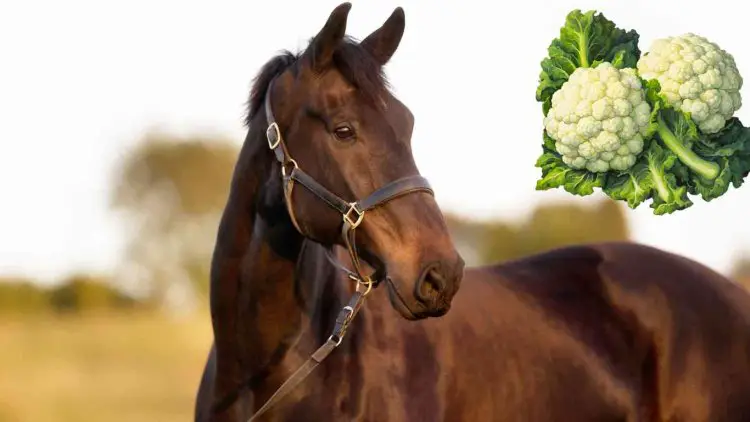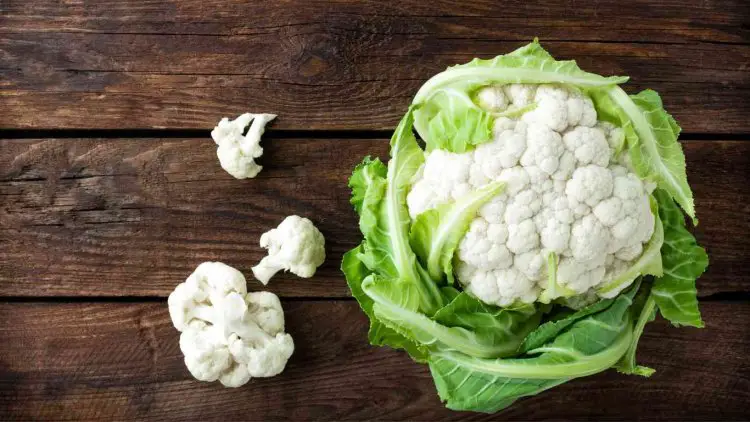Can Horses Eat Cauliflower? Safe & Harmful Foods For Horses
"Can horses eat cauliflower?" As a fellow horse lover, I totally get the urge to share healthy human foods with our four-legged friends. But some veggies like cauliflower can actually cause horses harm. Join me as we explore what horses can and can't eat. I'll share insider tips on safe fruits, veggies, and treats for horses. You'll also learn what foods are dangerous for horses, like chocolate, caffeine, and even cauliflower. Want the best for your horse's health and happiness? Let's chat about crafting the ideal diet and avoiding risky foods that can cause digestive upset. I'll answer common questions like "Can horses eat cabbage?" and "What vegetables are good for horses?" Get the definitive guide to feeding horses right here.

Table of Contents
Introduction
Horses are herbivores, and their diet consists primarily of hay and grass to meet their daily nutritional requirements. However, as a horse owner or enthusiast, you might want to treat your horse with some fresh vegetables or fruits. The question that arises is, "Can horses eat cauliflower?" Let's explore this topic in more detail.
Can Horses Eat Cauliflower?

As a horse owner, you might have wondered if it's safe to feed cauliflower to your horse. Cummings School of Veterinary Medicine states that you should not feed your horse with cauliflower or any cabbage in the brassica family. Other vegetables in this family include Brussels sprouts, broccoli, kale, cauliflower, and obviously cabbages. Unfortunately, horses cannot tolerate cauliflower and may experience digestive issues with the vegetable. While horses need a diet of fibrous feed, cauliflower can cause bloating and gas, making it unsuitable for consumption. They are highly fibrous and can be challenging for horses with sensitive digestive systems to break down. So, the answer to this question is a definite no.
Why Can't Horses Eat Cauliflower?
Horses have a sensitive digestive system that operates differently from other herbivores. They have complex digestive mechanisms and utilize microbes in their hindgut to ferment feed effectively. Cauliflower contains complex fibers and sugars that horses have trouble breaking down, leading to digestive upset and other complications.
Moreover, cruciferous vegetables like cauliflower are known to increase gas production in horses and lead to bloating and colic issues. Horses cannot get rid of the excess gas quickly, which can lead to severe distress and discomfort.
Related: Can Horses Eat Cucumbers: Yes or No?
Can Horses Eat Cauliflower Leaves?
Just like the cauliflower heads, even the leaves are hard for horses to handle. They're super fibrous and can mess with a horse's delicate digestive system. So, let's just play it safe and leave the cauliflower out of their feed bucket.
Vegetables and Fruits That Are Safe For Horses
Even though cauliflower's not a great choice, loads of fruits and veggies are both safe and nutritious for horses and they add a bit of fun to their diet too! Let's look at some of the safe-to-eat goodies:
Carrots: Almost every horse I've met goes giddy for a crispy carrot. Plus, they're packed with beta-carotene, great for skin and coat health.
Turnips: A nice source of fiber and carbohydrates, but remember: serve them in moderation.
Celery: Perfect for a hot day, it's hydrating and low-calorie, making it a nice, light treat.
Bananas and Pineapple: Why not go a bit tropical now and then? Both these fruits are horse-safe and offer a sweet change of pace.
Strawberries: Aside from being delicious, they're filled with antioxidants that'll keep your horse feeling spry.
Pumpkins and Melons: Fantastic for a fun, seasonal treat. Pumpkins, in particular, have plenty of fiber and vitamin A, essential for your horse's eye health.
But, hold your horses! While it's great to offer fruits and veggies, moderation is key. Remember, these should only account for a small portion of your horse's diet, and try introducing them gradually to avoid any nasty stomach upsets.
Other Foods That Are Not Good for Horse Treats
Beyond cauliflower, there are other two-legged food favorites you ought to keep away from your horses. Watch out for:
Caffeine: Caffeine is a stimulant and can make horses jittery and up their heart rate.
Chocolate: Say no to chocs for horses since it contains theobromine. It can cause serious health problems, so steer clear of any chocolatey treats.
Avocado: Avocados have a toxin called persin that can negatively impact horses. Don't put avocados on their menu.
Broccoli and Cabbage: Like cauliflower, these veggies have tough fibers that horses struggle to digest, potentially causing discomfort.
Dairy products: Dairy's a no-go, as most horses are lactose intolerant and can't digest milk sugars well.
Potatoes: While we might love some crispy fries, green or uncooked potatoes can contain toxins harmful to horses.
Persimmons: These citrus relatives have tannins causing intestinal blockages in horses, so best avoid them.
Bread: It might be a staple in our diet, but bread doesn't offer much nutritional value to horses and could contribute to weight gain and digestive issues.
To keep your horse healthy and happy, stick to their regular diet of hay, grass, and the horse-safe fruits and veggies I mentioned earlier.
What Foods Should A Horse Eat?
Now that we've dealt with the don'ts, let's move on to the do's – what should a horse really be eating? A horse's diet should be made up of:
Pasture Grass: Mother nature's buffet, it's high in fiber and offers essential nutrients. Horses do well with access to grazing pastures whenever possible.
Hay: Especially critical when fresh pastures aren't available, quality hay helps with digestion and can help maintain a healthy weight.
Fruits and Vegetables: Fruits and veggies can be fun, nutrient-packed additions to their diet, just make sure they don't replace their main feed of hay or grass.
Grains: Grains like oats, corn, and barley can be added but keep in mind, not all horses need them, and too much could cause health problems. Check with your veterinarian before changing your horse's diet.
Salt: Horses need a constant supply of salt lick to meet their mineral and sodium needs.
FAQs
What vegetables can horses not eat?
When it comes to what veggies horses shouldn't eat, you've got to steer clear of the brassica family. That includes cauliflower, broccoli, kale, and cabbages. These veggies contain complex fibers and sugars, making them hard for our equine friends to digest. They can even cause bloating and gas, so it's best to leave these out of their diet.
Can horses eat cabbage?
Nope, horses can't eat cabbage. Cabbage is part of that pesky brassica family I've mentioned earlier, along with cauliflower, broccoli, and kale. These veggies unfortunately don't sit well with the sensitive digestive systems of horses. So, while you might enjoy some coleslaw, I'd keep the cabbage away from the stable.
What is unsafe for horses to eat?
Well, as much as we might love to share our snacks, many of them are a no-go for horses. Caffeine, chocolate, avocado, and even some types of bread can harm our equine friends. Let's not forget the brassica family of veggies such as cabbage, cauliflower, broccoli, and kale. Also, raw potatoes and persimmons might seem tempting, but they can be toxic to horses. And remember, dairy products are out too horses are lactose intolerant.
What vegetables are good for horses?
While there's a list of what they can't eat, there are loads of veggies horses CAN and love to eat! Carrots, turnips, and celery are all popular and safe options for horses. They provide key nutrients and add a fun twist to their typical diet. But remember, moderation is key! Also, why not jazz things up with occasional fruits like bananas, pineapples, and even strawberries that are safe, nutritious, and give that sweet treat horses sometimes need? Just slowly introduce new foods to avoid any riots in the stable.
Conclusion
Understanding what foods to include in your horse's diet and avoiding potentially harmful items like cauliflower is essential for optimal health and digestive function. It's always better to be safe than sorry when it comes to feeding your horse, and you must seek your vet or equine nutritionist's recommendations. A well-balanced diet and proper feeding guidelines will help your horse thrive.
What's Your Reaction?

















